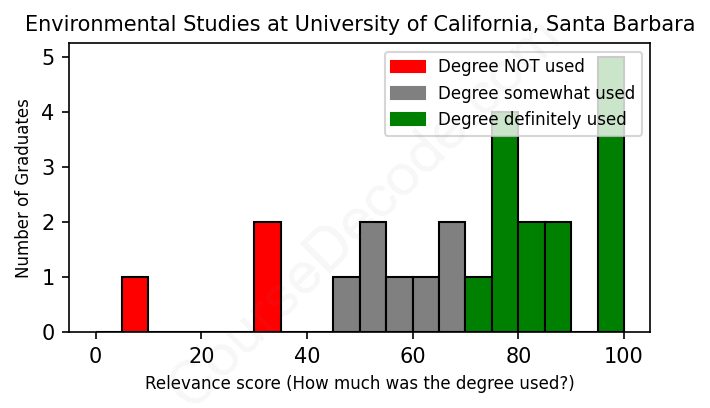
First, some facts. Of the Environmental Studies graduates from University of California, Santa Barbara we've analyzed , here's how many have used (or NOT used) their degree in their career:

These are estimates based on AI analysis of 24 LinkedIn profiles (see below).
The verdict? Slightly above average. Overall, with an average relevance score of 69%, Environmental Studies graduates from University of California, Santa Barbara have a slightly higher likelihood (+2%) of finding work in this field compared to the average graduate across all fields:
And for comparison, here's the chart for all profiles we've looked at across all degrees.
Also, after graduating, 58% of these graduates have pursued further education other than another Bachelor's degree (such as a Masters degree or other), compared to the average across all profiles of 35%. This suggests you may need more than just a Bachelors degree to be competitive as a Environmental Studies graduate.
See the details:
|
Relevance score: 47% We think this person has gone into a career only somewhat relevant to their degree. We think this person has gone into a career only somewhat relevant to their degree.
DEGREE INFOGraduated in 2020 from University of California, Santa Barbara with a Bachelor's degree in Environmental Studies. No other secondary education since. JOB HISTORY SINCE GRADUATIONSales Associate Aeropostale Apr 2021 - Jun 2021 Pharmacy Technician  CVS Pharmacy Jun 2021 - Present ABOUTNo information provided. |
The top 10 most common jobs done by the graduates we've analyzed (ranked most common to least) are:
From the analysis of LinkedIn profiles of graduates from UC Santa Barbara with degrees in Environmental Studies, it's clear that many of these individuals gravitated towards roles that have varying levels of relevance to their field of study. Many of the more predominant positions include roles in legal advocacy, project management, and environmental research. Positions such as Law Clerks at organizations focusing on Native American rights, project managers in energy-focused companies, and research assistants in environmental projects are common. These job roles reflect a strong connection to core Environmental Studies principles, as they often engage directly with topics such as sustainability, environmental justice, and ecological conservation.
However, there are also numerous examples where the relevance drops significantly. Jobs like bartending, retail positions, or even roles in IT and administrative work show that not every graduate is employing the environmental knowledge from their coursework in their day-to-day jobs. It’s a mixed bag: while many grads have successfully applied their education in meaningful environmental roles, several others have taken paths that, while might intersect with environmental concepts, do not directly use their specific Environmental Studies skills on a daily basis. Overall, while there is significant relevance for a good number of graduates, the connection to Environmental Studies is less pronounced in various other job roles within the analysis.
Here is a visual representation of the most common words in job titles for Environmental Studies graduates (this is across all Environmental Studies graduates we've analyzed, not just those who went to University of California, Santa Barbara):

From what I can see, graduates of Environmental Studies from UCSB have carved out quite a range of career paths. For many, their first jobs after graduation often relate to internships or entry-level roles in environmental research, project management, or conservation. It’s not uncommon for them to start out as research assistants, project coordinators, or even camp counselors which gives them a foothold in their field right out of college. The degree seems to set a solid foundation for those keen on working in environmental policy, consultancy, or advocacy, which comes through in the LinkedIn profiles analyzed.
Fast forward five to ten years, and it looks like many of these grads have worked their way up to more substantial positions. A number have transitioned into roles such as project managers, analysts, and even legal positions that center around environmental issues, showing that they’ve maintained a connection with their degree. Some have even taken on leadership roles within their organizations, indicating progression and growth. That said, there are a few who have wandered off the path a bit, taking on roles that seem less aligned with environmental studies, like retail or food service jobs. But overall, most grads appear to be successfully building careers that are meaningful and relevant to their environmental studies backgrounds. So, if you’re considering this path, it seems like a pretty good one with solid potential for growth in the field!
Honestly, a Bachelor’s degree in Environmental Studies at UC Santa Barbara can be pretty challenging, but it’s not impossible. UCSB has a solid reputation for its environmental programs and the coursework can be demanding, involving a mix of science, policy, and social issues related to the environment. You’ll likely encounter a fair amount of reading, research, and fieldwork, which keeps things interesting but can also pile on the work. A lot of students find it easier compared to more rigorous STEM majors, but that doesn’t mean it’s a walk in the park. If you’re passionate about the environment and ready to dive into some serious topics, you’ll probably enjoy it—just be prepared to put in some effort!
Most commonly, in the LinkedIn profiles we've looked at, it takes people 4 years to finish a Bachelor degree in Environmental Studies.
Looking at the career paths of these UCSB Environmental Studies grads, it seems like they have a mix of financial success. Some folks, especially those who landed in more technical roles or concentrated on management positions, have probably done pretty well for themselves, like the project managers or the attorneys who likely command decent salaries. On the other hand, several grads took roles that seem more about passion and experience—like outdoor adventure jobs or research positions—that probably don’t pay as well. Overall, while there are definitely success stories with solid incomes, others might be grinding it out in positions that won't lead to a huge paycheck, so it’s kind of hit or miss!
Here is a visual representation of the most common words seen in the "about" section of LinkedIn profiles who have a Bachelor degree in Environmental Studies (this is across all Environmental Studies graduates we've analyzed, not just those who went to University of California, Santa Barbara). This may or may not be useful:

Here are all colleges offering a Bachelor degree in Environmental Studies (ordered by the average relevance score of their Environmental Studies graduates, best to worst) where we have analyzed at least 10 of their graduates:
| College | Score | Count |
|---|---|---|
 California State University-Sacramento California State University-Sacramento
|
89 | 10 |
 University of Vermont University of Vermont
|
72 | 21 |
 University of California, Santa Barbara University of California, Santa Barbara
|
69 | 24 |
 University of California, Santa Cruz University of California, Santa Cruz
|
59 | 31 |
 Florida State University Florida State University
|
57 | 10 |
 University of Washington University of Washington
|
57 | 13 |
 UC Santa Barbara UC Santa Barbara
|
57 | 15 |
 University of Oregon University of Oregon
|
56 | 13 |
 University of Colorado Boulder University of Colorado Boulder
|
53 | 24 |